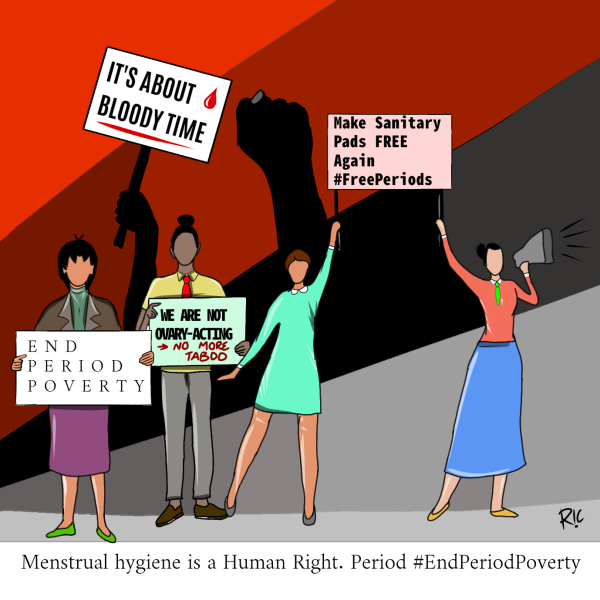
By Machoni Seliphar
Many girls, especially those coming from poor backgrounds, face a lot of challenges. Lack of sanitary towels is one of the challenges that such girls face in their life. Many drop out of school, perform poorly in their academics, have low self-esteem and even end up becoming teenage mothers as a result of poverty and shame. In Kakamega county, Lurambi constituency in Mwiyala community, Leah Malesi misses school five days every month because she doesn’t have money to buy sanitary towels. I met Leah when I was doing my attachment in the area and her story touched me. Leah is just but one of the many
girls in Kakamega County and over 800 million women and girls across the world that have to go through this challenge every month. These girls will miss an average of 20% of the school year because they lack sanitary towels that can keep them in school when that time of the month approaches. Pads poverty and pad shame can lead to poor performance, low self-esteem, humiliation, early pregnancies, and even health complications for these girls and women as a whole. There is a
need to end this stigma that comes with a lack of sanitary towels, especially for school-going girls. It will go a long way in restoring a girl’s dignity, health, education, livelihood, and employment.
When we talk about pad poverty this refers to a challenge or an issue that is affecting many women or girls in Kenya today as they are unable to either attend a school or go to their places of work simply because they are not in a position to afford sanitary towels. It causes a huge impact on their life. In Kenya, a pack of sanitary napkins costs seventy shillings, not every girl can get that seventy shillings every month especially those from poor families who can hardly afford one meal a day. Due to the high poverty rate in Kenya, 65% of women and girls face a big challenge in accessing these products.
Apart from missing classes and staying at home because of a lack of sanitary towels, it also poses a risk to a girl’s health. In Kakamega County, especially in rural areas several pad users get them from either sexual partners or fall into the trap of bodaboda operators. Many practices unprotected sex just to pay for the sanitary towels they have received from the men. This can result in early pregnancies which will be an additional problem and a burden to the girl’s family. Pads’ poverty shows how vulnerable a girl is as she is forced to seek assistance from others for her basic needs. In Kakamega County and Kenya at large, apart from girls and women coming from poor backgrounds and poverty-stricken areas that make it difficult for them to afford sanitary pads, they are facing a huge stigma and misunderstanding as it comes to menstruation. The stigma can lead to low self-esteem and it happens in schools, classes, and communities. Back to Leah’s case who narrated to me that she once thought of dropping out of school because of period shame when she once became an object of mockery, laughter, and a topic of discussion in her class and the entire school when the rags she was using as sanitary towels become full and the flow stained her uniform. The 13-year-old received humiliation from other pupils as everyone called her “dirty sticking girl” which affected her esteem and confidence at school. From Leah’s scenario, we can see the impacts of period poverty and period shaming in Kenya and how bad it can affect a girl’s life. In 2017, Kenya passed a law to give schoolgirls free sanitary pads sponsored by the government. The law was an amendment to The Education Act
and states that “free, sufficient and quality sanitary towels” will be provided to all girls registered at school. The law seems to have been forgotten as many girls continue to suffer and have to face poverty and shame each month. To end poverty shame and poverty something has to be done. The first step into cubing this is for the county government together with the national government to come up with ways to provide such essential needs to schools both primary and secondary each month to enable girls to stay in school. Make sanitary pads free for every school-going girl and accessible to ensure that our girls and women are not forced to put themselves into unbearable situations to get menstrual products. The second step educating girls and women about menstrual hygiene and how to remain healthy when on their periods. Apart from educating girls and women, educating boys and men will also help in ending stigma and period shame. Men must be informed about what periods mean, and how to support women during theirs.


